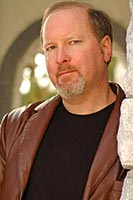I’ve crossed a number of milestones over the past few years: first short story published, first convention panelist, first novel in print, first teaching gig at a writing conference. I’ve managed to predictably repeat those achievements virtually at will, and as nothing more or less than an act thereof. Each and every one of those milestones felt like the success it was, but they were all, at best, minor-league achievements.
Make no mistake, though. To achieve them I’ve had to climb the highest, steepest mountain in my experience. And I have a long way to go.
My career-change from “IT guy” to “writer” back in 2009 set me as my own task master, and I don’t think I’ve ever worked harder. However, every milestone I’ve passed thus far has been small—insignificant when compared to the summit I intend to reach. Added up, however, the sum of those milestones made possible my most current opportunity… and crisis… from which I should be able to derive my greatest achievement to date.
I’m under contract to write a novel.
There is something both thrilling and daunting about committing to a novel under contract rather than selling a completed manuscript.
Daunting.
That word doesn’t quite cut the mustard. Frankly, I’m nervous as hell, hoping I can get Last Stand at the Gates of Heaven written within a somewhat aggressive timeline… and on top of everything else I’m committed to for the first half of 2014. As I type this, the publisher has nothing more in her hands than a title and the pitch I gave her back in November. I, on the other hand, have a deadline and a deliverable of roughly 100k words by the end of May.
What this represents is a first step into the major leagues. Granted, it’s a smaller publisher asking for a stand-alone novel, but the fact is that a publisher asked me to produce a novel. I’m on the hook for delivery. My reputation is at stake. My future is at stake. If I can deliver on this, I’ll know that I can cut it when a large publisher asks me to produce a body of work.
There’s a reason I’m telling you this, and it’s not to sing my own accolades. Quite the contrary. I’m humbled by these circumstances. I’m telling you all this because the path I’m on is one of the primary methods by which part-time writers become self-supporting authors.
The pyramids were not built in a day; each one of them started with a single block. Everest wasn’t climbed over a weekend, and every man or woman who reached that summit started with a single step at its base.
That’s what you have to understand in the writing business. Skill is a factor. So is practice and talent and luck and a lot of things. But if you’re not prepared to build upon your small successes and turn them into larger ones, you should hang it up right now. You have to be in this business for the long haul and grind away as much as you can without losing your mind. You have to invest in yourself each and every day in some fashion, gambling with your own future and the harsh reality that you might not make it.
If you can do all of that, your odds of success increase exponentially. And in the absence of it all, you are virtually guaranteed to fail.
So get to work!
Q

![2283676770_6b53f8b77f_b[1]](http://www.fictorians.com/wp-content/uploads/2014/01/2283676770_6b53f8b77f_b1-300x225.jpg) Today is the first day of the New Year where many people will be doing something that they rarely do: actually manage their time to do something that needs to get done. It could be working out, taking the stairs, balancing their checkbook, or writing an hour a day. Somehow, they’ll have time to do it… and for many it’ll fade away in a couple weeks.
Today is the first day of the New Year where many people will be doing something that they rarely do: actually manage their time to do something that needs to get done. It could be working out, taking the stairs, balancing their checkbook, or writing an hour a day. Somehow, they’ll have time to do it… and for many it’ll fade away in a couple weeks.